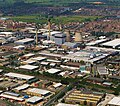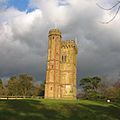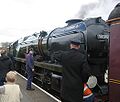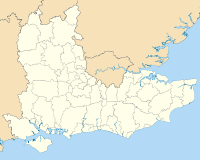Portal:South East England
The South East England Portal

South East England is one of the nine official regions of England in the United Kingdom at the first level of ITL for statistical purposes. It consists of the counties of Buckinghamshire, East Sussex, Hampshire, the Isle of Wight, Kent, Oxfordshire, Berkshire, Surrey and West Sussex. Major towns and cities in the region include Brighton and Hove, Canterbury, Milton Keynes, Southampton, Portsmouth, Slough, Reading and Oxford.
South East England is the third-largest region of England, with a land area of 19,072 square kilometres (7,364 sq mi), and is also the most populous with a total population of over nine million. The region contains eight legally chartered cities: Brighton and Hove, Canterbury, Chichester, Milton Keynes, Oxford, Portsmouth, Southampton and Winchester. The region's close proximity to London has led to South East England becoming a prosperous economic hub with the largest economy of any region in the UK, after London. The region is home to Gatwick Airport, the UK's second-busiest airport, and Heathrow Airport (the UK's busiest airport) is located adjacent to the region's boundary with Greater London. The coastline along the English Channel provides numerous ferry crossings to mainland Europe.
The region is known for its countryside, which includes two national parks: the New Forest and the South Downs, as well as the North Downs, the Chiltern Hills and part of the Cotswolds. The River Thames flows through the region and its basin is known as the Thames Valley. It is also the location of a number of internationally known places of interest, such as HMS Victory in Portsmouth, Cliveden in Buckinghamshire, Thorpe Park and RHS Wisley in Surrey, Blenheim Palace in Oxfordshire, Windsor Castle in Berkshire, Leeds Castle, the White Cliffs of Dover and Canterbury Cathedral in Kent, Brighton Palace Pier, and Hammerwood Park in East Sussex, and Wakehurst Place in West Sussex. The region has many universities; the University of Oxford is the oldest in the English-speaking world, and ranked among the best in the world.
South East England is host to various sporting events, including the annual Henley Royal Regatta, Royal Ascot and The Derby, and sporting venues include Wentworth Golf Club and Brands Hatch. Some of the events of the 2012 Summer Olympics were held in the south east, including the rowing at Eton Dorney and part of the cycling road race in the Surrey Hills.
In medieval times, South East England included much of the Kingdom of Wessex, which was the precursor to the modern state of England. Winchester was the capital of England after unification of the various states, including the kingdoms of Kent, Sussex and Mercia. Winchester stopped being the administrative capital of England some time in the 13th century as its influence waned while the City of London dominated commerce. The last monarch to be crowned at Winchester was Richard II in 1377, although the last monarch to be crowned by the Bishop of Winchester was Queen Mary I in 1553. (Full article...)
Selected article
Milton Keynes (/kiːnz/ KEENZ) is a city in Buckinghamshire, England, about 50 miles (80 km) north-west of London. At the 2021 Census, the population of its urban area was 264,349. The River Great Ouse forms the northern boundary of the urban area; a tributary, the River Ouzel, meanders through its linear parks and balancing lakes. Approximately 25% of the urban area is parkland or woodland and includes two Sites of Special Scientific Interest (SSSIs).
In the 1960s, the government decided that a further generation of new towns in the South East of England was needed to relieve housing congestion in London. Milton Keynes was to be the biggest yet, with a population of 250,000 and area of 22,000 acres (9,000 ha). At designation, its area incorporated the existing towns of Bletchley, Fenny Stratford, Wolverton and Stony Stratford, along with another fifteen villages and farmland in between. These settlements had an extensive historical record since the Norman conquest; detailed archaeological investigations before development revealed evidence of human occupation from the Neolithic period, including the Milton Keynes Hoard of Bronze Age gold jewellery. The government established Milton Keynes Development Corporation (MKDC) to design and deliver this new city. The Corporation decided on a softer, more human-scaled landscape than in the earlier English new towns but with an emphatically modernist architecture. Recognising how traditional towns and cities had become choked in traffic, they established a grid of distributor roads about 1 kilometre (0.62 mi) between edges, leaving the spaces between to develop more organically. An extensive network of shared paths for leisure cyclists and pedestrians criss-crosses through and between them. Rejecting the residential tower block concept that had become unpopular, they set a height limit of three storeys outside Central Milton Keynes.
Facilities include a 1,400-seat theatre, a municipal art gallery, two multiplex cinemas, an ecumenical central church, a 400-seat concert hall, a teaching hospital, a 30,500-seat football stadium, an indoor ski-slope and a 65,000-capacity open-air concert venue. Seven railway stations serve the Milton Keynes urban area (one inter-city). The Open University is based here and there is a small campus of the University of Bedfordshire. Most major sports are represented at amateur level; Red Bull Racing (Formula One), MK Dons (association football), and Milton Keynes Lightning (ice hockey) are its professional teams. The Peace Pagoda overlooking Willen Lake was the first such to be built in Europe. The many works of sculpture in parks and public spaces include the iconic Concrete Cows at Milton Keynes Museum.
Milton Keynes is among the most economically productive localities in the UK, ranking highly against a number of criteria. It has the UK's fifth-highest number of business startups per capita (but equally of business failures). It is home to several major national and international companies. Despite economic success and personal wealth for some, there are pockets of nationally significant poverty. The employment profile is composed of about 90% service industries and 9% manufacturing. (Full article...)
Selected pictures
Selected biography
Alfred Thompson Denning, Baron Denning, OM, PC, DL (23 January 1899 – 5 March 1999), was an English barrister and judge. He was called to the bar of England and Wales in 1923 and became a King's Counsel in 1938. Denning became a judge in 1944 when he was appointed to the Probate, Divorce and Admiralty Division of the High Court of Justice, and transferred to the King's Bench Division in 1945. He was made a Lord Justice of Appeal in 1948 after less than five years in the High Court. He became a Lord of Appeal in Ordinary in 1957 and after five years in the House of Lords returned to the Court of Appeal as Master of the Rolls in 1962, a position he held for twenty years. In retirement he wrote several books and continued to offer opinions on the state of the common law through his writing and his position in the House of Lords.
Margaret Thatcher said that Denning was "probably the greatest English judge of modern times". One of Lord Denning's successors as Master of the Rolls, Lord Bingham, called him "the best known and best loved judge in our history". Denning's appellate work in the Court of Appeal did not concern criminal law. Mark Garnett and Richard Weight argue that Denning was a conservative Christian who "remained popular with morally conservative Britons who were dismayed at the postwar rise in crime and who, like him, believed that the duties of the individual were being forgotten in the clamour for rights. He had a more punitive than redemptive view of criminal justice, as a result of which he was a vocal supporter of corporal and capital punishment." However, he changed his stance on capital punishment in later life.
Denning became one of the highest profile judges in England in part because of his report on the Profumo affair. He was known for his bold judgments running counter to the law at the time. During his 38-year career as a judge, he made large changes to the common law, particularly while in the Court of Appeal, and although some of his decisions were overturned by the House of Lords several of them were confirmed by Parliament, which passed statutes in line with his judgments. Appreciated for his role as "the people's judge" and his support for the individual, Denning attracted attention for his occasionally flexible attitude to the common law principle of precedent. He commented controversially about the Birmingham Six and Guildford Four. (Full article...)
On This Day in South East England
14 June:
- 1216: First Barons' War: Prince Louis of France took the city of Winchester, abandoned by John, King of England, and soon conquered over half of the kingdom.
- 1839: The first Henley Royal Regatta took place.
- 1961: Singer-songwriter and producer Boy George was born at Barnehurst Hospital, Kent.
- 1965: The Cranleigh line, between Guildford and Horsham, was closed by British Rail.
Categories
Related portals
WikiProjects
Topics
Associated Wikimedia
The following Wikimedia Foundation sister projects provide more on this subject:
-
Commons
Free media repository -
Wikibooks
Free textbooks and manuals -
Wikidata
Free knowledge base -
Wikinews
Free-content news -
Wikiquote
Collection of quotations -
Wikisource
Free-content library -
Wikiversity
Free learning tools -
Wikivoyage
Free travel guide -
Wiktionary
Dictionary and thesaurus

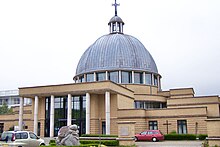







![Image 10 Credit: Michael Wilmore The Kent & East Sussex Railway was opened by Colonel H.F. Stephens, the railway engineer, in 1900. At its fullest extent, it ran nearly 22 miles[35km] from Robertsbridge on the Tonbridge to Hastings main line to Headcorn on the main line between Tonbridge and Ashford, Kent. More about the Kent & East Sussex Railway... (from Portal:Kent/Selected pictures)](http://upload.wikimedia.org/wikipedia/commons/thumb/2/2f/KentAndEastSussexRailway%28MichaelWilmore%29Oct2005.jpg/120px-KentAndEastSussexRailway%28MichaelWilmore%29Oct2005.jpg)












